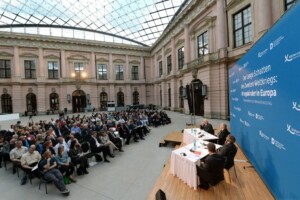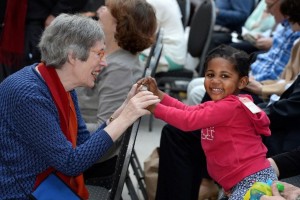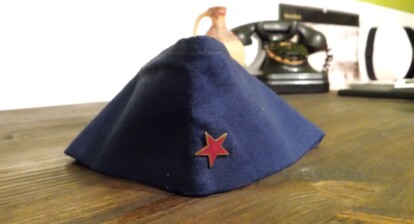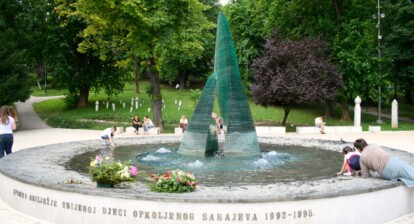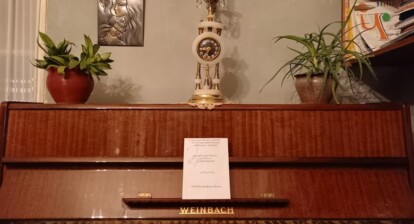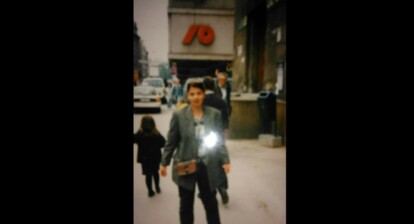The first victims in every war are the children. Milena, a 28 year old student from Serbia, is interested in the long shadows of World War II on people who had experiences it being young. From the panelists of a Remembrance Day in Berlin she wanted to know: What could it mean for a war-child to be claimed, integrated, ignored or made silent in post-war societies? “In the social jungle of human existence, there is no feeling of being alive without a sense of identity.” Erik Erikson
Experiencing war as a child can leave many long-lasting marks on a person. Being parentless may force children to learn how to cope on their own at an early stage. Having to migrate can bring one many, maybe too many, home countries and discrimination could change one’s personal identity.
The issue of war children was discussed in Berlin during the European Remembrance Day “Long shadow of the World War II: War children in Europe” on 4th of May. Special attention was given to the eternal questions which are especially important when talking about the identity of war children: Who am I and where do I come from? The Remembrance Day was organized by the Koerber Stiftung and the German Historical Museum, and experts from historians to writers took part in the discussions.
Home in three countries
During the first panel of the day, author Arno Surminski, historian Ruth Leiserowitz and professor Heide Fehrenbach discussed the long-term consequences of parentlessness. They also talked about how societies managed to cope with the orphans in the post-war era.
Mr. Surminski emphasized that he developed a strong sense of will and determination due to the loss of his parents, who were sent to a labor camp in the Soviet Union after WWII, and expulsion from his homeland East Prussia as a child. Those events shaped his identity, so today there are three places that he calls homes: Canada, Germany and East Prussia.
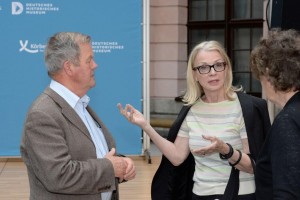
Panel on the topic of periods of occupation encourage vivid disscusions. (Photo: Körber-Stiftung / David Ausserhofer)
Mrs. Leiserowitz agreed that the question of identity was a big issue after the war. This was the case for the parentless Jewish children but also for German orphans in the regions that became part of Poland and the Soviet Union. The public attitude towards German orphans was everything but united and many of them were forced to hide their heritage. Some even forgot their names, family backgrounds and native language, and many had to wait decades to feel free to reveal their roots. With this example Mrs. Leiserowitz reminded us of a problem that many post-war societies had to cope with. What to do with these children? Claim them, integrate them, or ignore them and make them silent?
The children of German soldiers in Norway
During the panel that dealt with periods of occupation, Mr. Stein Ugelvik Larsen, Norwegian political scientist, also engaged in a problem of identity of war children. “Those kids suffered for decades and were not able to claim their identities”, Mr. Larsen said, referring to children born in 1945 and 1946 between German soldiers and Norwegian mothers.
Norwegian society`s way of dealing with those 10.000–12.000 war children was to ignore them, discriminate them or silent them. It was common for children and their mothers to suffer repercussion from local population and so many of them harbored feeling of guilt and shame. “Most of them didn`t know why they were molested” Mr. Larsen said.
Only in the late of 80s and 90s they were able to acknowledge their status as war children and obtain official recognition for past mistreatment. But not all of them succeed at that, because of problem of proving their identity as a German soldier’s child. Mr. Larsen suggested that the United Nations should establish a “War Children Protocol”, and that Europe should be the one to insist on a proposal, due to learning from its history. Because how can children of war claim their rights founded in a UN Convention of the rights of the child, if their status is not clear? This protocol should allow them access and right to information so they can claim their heritage and identity.
History is repeating itself
Mr. Larsen and other participants of the panel agreed that today we are reliving similar things that happened 70 years ago in Europe. There are still conflicts, and in all wars children are born in relationships between enemy soldiers and indigenous women. Those kids should not represent burden or instrument of governments for revenge or washing away guilt, but on contrary societies should draw benefits in learning from those kids about different nations, cultures and heritages.
Personal impressions
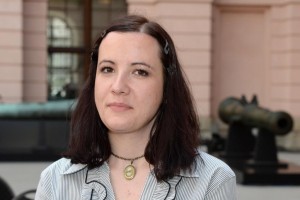
Milena Tatalovic attending the Remembrance day at German historical museum. (Photo: Körber-Stiftung / David Ausserhofer)
Coming from a small Balkan country, burdened with a past of its own society, it can be a challenging task to overcome the split between national and European identity. But as soon as authors started sharing their personal memories, somehow I could easily find similarities between their and my grandparents’ recollections.
At the end of the official part of the program I approached to Mr. Larsen to ask him for little more impressions of the day. We spoke about different reflections on Children of War in our countries, and I told him my idea to do a research about Serbian war children in Yugoslavia in post-war era. “You should do that, you should convey that research! And after that you should write me what you discovered and we can discuss your results.” Mr. Larsen said, writing down his email in my notebook.
He encouraged me and reminded me one more time that each story counts and should be told and preserved. Only by learning from our past, sharing our experiences and overcoming our differences we can hope for united Europe in these challenging times.


